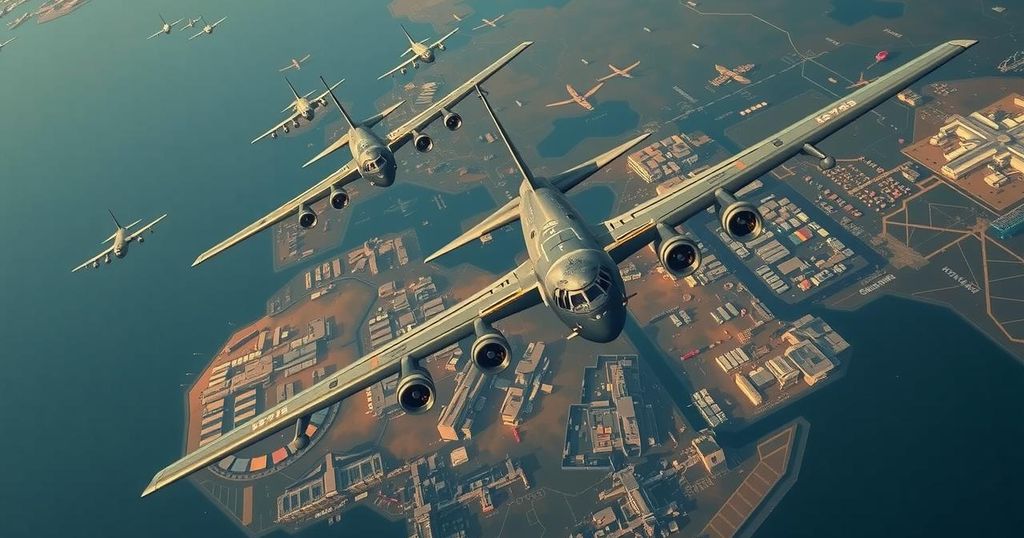American B-52 bombers have been deployed to the Middle East as a warning to Iran. The Israeli military has issued evacuation orders for the Baalbek region of Lebanon due to planned strikes on Hezbollah targets. In Iran, protests commemorated the 1979 hostage crisis, reflecting ongoing anti-American sentiment. Tensions escalated with the confirmation of an Iranian-American journalist’s detention in Iran amidst threats from Tehran towards both Israel and the U.S.
On Saturday, American B-52 bombers arrived in the Middle East following an announcement from the U.S. government regarding their deployment aimed as a cautionary measure directed towards Iran. The Pentagon articulated that this strategic move was designed to safeguard U.S. personnel and interests in the region. The ongoing situation remains dynamic, and updates will be provided as the circumstances unfold. In related developments, the Israeli military has issued evacuation warnings for the Baalbek region in eastern Lebanon, alerting residents of imminent strikes targeting Hezbollah installations in that vicinity. Israeli spokesperson Avichay Adraee communicated through social media that individuals located near these Hezbollah-associated facilities should evacuate promptly. Simultaneously, several protests took place in Iran, commemorating the anniversary of the 1979 hostage crisis, which has perpetuated a complex and strained relationship between Tehran and Washington over the decades. Demonstrators gathered outside the former U.S. embassy in Tehran, with many chanting slogans against the U.S. and Israel, while some engaged in the symbolic burning of flags. In Tel Aviv, demonstrators voiced their anger towards the Israeli government for its inaction concerning the return of hostages from Gaza, advocating for a peaceful resolution to the ongoing conflict. Furthermore, tensions escalated as the U.S. State Department confirmed that an Iranian-American journalist, Reza Valizadeh, is currently detained in Iran, potentially exacerbating the situation in light of Iran’s recent threats against both the U.S. and Israel. This detention follows a pattern in which Iran has been noted to unjustly imprison foreign nationals for political leverage. In a statement regarding the B-52 bombers’ arrival, Major General Pat Ryder of the Pentagon affirmed that the U.S. would take all necessary actions to defend its personnel should Iran or its affiliates engage in hostile actions within the region. The military’s recent deployments also included fighter jets, tanker aircraft, and ballistic missile defense destroyers, emphasizing a robust military presence. As the situation continues to develop, the international community is observing the complexities of U.S.-Iran relations amid these heightened tensions, marked by military and diplomatic maneuvering.
The current geopolitical climate between the United States and Iran is characterized by a long history of strained relations dating back to the 1979 Iranian Revolution. The hostage crisis that ensued marked a definitive break in diplomatic relations, which have remained frozen for decades. The U.S. has consistently sought to deter Iran’s regional influence, evidenced by its military deployments and statements of intent to protect American interests globally. Concurrent crises, such as the ongoing conflict in Gaza and threats from Hezbollah, further complicate the landscape, prompting responses from both Israel and Iran.
In conclusion, the deployment of U.S. B-52 bombers to the Middle East represents a significant military maneuver aimed at countering potential threats from Iran, amidst a backdrop of increased tensions marked by protests and retaliatory threats from both nations. The precarious balance of power in the region remains in flux, underscoring the importance of diplomatic engagement alongside military preparedness. Furthermore, the plight of hostages in Gaza adds another layer of complexity to the ongoing conflict.
Original Source: www.france24.com






